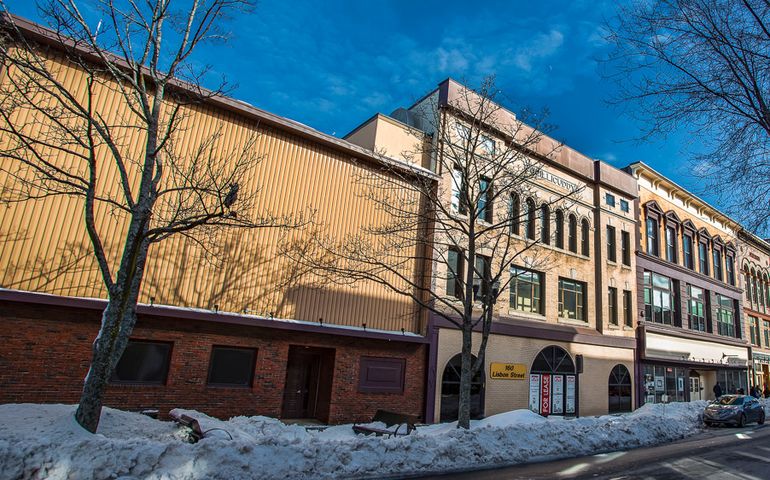
Lewiston draws developers and entrepreneurs seeking space, affordability — and opportunity
 Photo / Tim Greenway
Adam Cope, Eli Small and Tom Jordan are converting three interconnected historic buildings on Lisbon Street in Lewiston for residential and commercial use. “The interest is there,” says Cope.
Photo / Tim Greenway
Adam Cope, Eli Small and Tom Jordan are converting three interconnected historic buildings on Lisbon Street in Lewiston for residential and commercial use. “The interest is there,” says Cope.
In June 2022, Lewiston natives Angie Lafrance and Corey DuFour joined with another Maine native, Nathan Hines to hire a chef, Jules Muzyka, and open Obscura Cafe & Drinkery in Lewiston, expanding four months later to open a speakeasy-style event space on the lower level.
Lafrance and DuFour were long enchanted by the Art Deco building at 110 Lisbon St. in the city’s downtown district. The partners styled it for Obscura as “a step back in time” — 1920s cinematic posters, large projector screen showing silent films, antique furniture — bringing together artists and entertainers of all types and drawing a diverse mix of customers including long-time residents and folks who drive in from surrounding areas.
The projects have given them a view of an evolving downtown. “Just in this last year, I feel like I’ve seen more happening down here, finally, than in a long time,” Lafrance says of the downtown district.

Lewiston is experiencing a run of commercial development from the downtown to its outskirts – new retail and industrial activity, renovations and repurposing of historic buildings, new attractions pulling in local residents and visitors alike, new and expanding manufacturers of everything from hand-stitched hats to mushroom substrates.
“You have entrepreneurs who have started their own businesses, you have building owners who have renovate their buildings and you have businesses that are expanding,” says Lewiston Mayor Carl Sheline, a local business owner himself of MUNKA Coworking and MUNKA Studio, both on Lisbon Street.
The city also has projects underway, including housing redevelopment in the downtown’s “Tree Streets” neighborhood, expected to break ground this year. The effects of that project are already being felt.
“People are buying property in the area and starting new businesses and renovating buildings,” Sheline says.
Sheline credits Lewiston’s economic development team for its “can-do” attitude that supports business. Demographic trends, he says, show Lewiston’s population is among the youngest for Maine, largely due to an influx of New Mainers. A burgeoning suite of events attracts crowds of visitors almost weekly during the summer, with more events cropping up in the off-season.

Sheline says that, as Maine’s second-largest city, Lewiston’s advantages are many for residents, developers and business owners.
“We have a thriving downtown that people want to be part of. People want to start businesses here and want to live here,” he says. “We have health care, we have higher education, we have industrial. You’d be hard-pressed to find a sector or industry that doesn’t have some sort of presence in Lewiston. And we have a variety of options available for businesses that want to expand or relocate.”
Filling residential demand
Lafrance says, anecdotally, she’s noticed a growing presence in recent years of residents in their 30s and 40s who have moved to Lewiston and the surrounding area from southern Maine and Portland.
“They’re getting pushed out of those areas and they’re now looking for homes around here,” Lafrance says.
Developers have noticed, too.
In 2021, Adam Cope, Eli Small and Tom Jordan of Portland, liking Lewiston’s positive outlook and energy, bought 152, 160 and 168 Lisbon St. They’ve converted 168 Lisbon St. from office to mid- to high-end residential loft units, with features like hardwood floors and 16-foot ceilings. Similar conversions are underway in the other buildings, with space also available to office and startup tenants.
“The interest is there,” says Cope. “Maybe people aren’t beating down the doors, but it’s there and we feel like it’s building.”
Jason Hutchins plans to convert 145 Lisbon St., known as the Professional Building and dating to 1915, from office to residential use.
Hutchins is the third owner in three years. Previous owners looked toward office users.
But given uncertainty in today’s office market, the building’s narrow structure — 25 feet wide by 100 feet long, and the need for large capital expenditures, Hutchins says he saw potential for small market-rate apartments with modern refits but honoring historical details. The renter market is expected to include college students, hospital staff and employees of new businesses.
“We’ll be a little early in what we’re offering,” he said. “We don’t feel the Lewiston market is quite where we’d hope it to be to invest this money. But we see other great buildings that people have done projects on, and others that are in the works. Hopefully, this brings people to the area and helps the town of Lewiston grow.”
Mill conversions
Half a mile to the west, overlooking the Androscoggin River, Lewiston-based Hebert Construction will begin restoration of Picker House Lofts, a $28.5 million project by the Szanton Co. as the owner and developer to convert a 79,000-square-foot building – at 2 Cedar St. in the 19th century Continental Mill complex – into 72 workforce and market-rate housing units.
The project is the first phase of Continental Mill’s redevelopment. The rest of the vacant 560,000-square-foot complex is owned by New Hampshire-based Chinburg Properties, whose president, Eric Chinburg, envisions up to 300 market-rate apartments.
“I think Lewiston is an awesome old mill town,” says Chinburg, who has mill projects in Maine, New Hampshire and Massachusetts and sees a need for market-rate housing in Lewiston.
“If we build it, we hope they’ll come,” he says.
Across the street, Chinburg owns the 19th century, 460,000-square-foot Hill Mill. In 2019, over half the space was leased to small manufacturing and other tenants that included distributors, textile and leather manufacturers, a gym, cabinet and musical instrument makers and professional services. Occupancy is about 70% now, due to new arrivals and expansions. Most tenants are from the surrounding area. But Fanning finds others are leaving Greater Portland in search of affordable real estate.
“We don’t have to market our vacancies,” says Chinburg’s property manager, John Fanning. “My people just tell other people, ‘You should look at the Hill Mill.’”
Fanning says it’s important to note that younger people are moving to Lewiston. “They’re creating vibrant businesses,” Fanning says.
More space, affordable rents

One younger Hill Mill tenant is Chris Lobley, 26, owner of C. Richard’s Leather. His firm specializes in custom leather patch hats that use U.S. leather and thread, in partnership with Springfield, Ore., headwear maker Richardson Sports.
Lobley recently expanded from 1,800 to 9,000 square feet, employs seven and annually sell tens of thousands of units, primarily wholesale. He started the business in his parents’ garage in Poland, but needed a place to grow.
“In my research I noticed there was a large amount of space available in Lewiston, in the Hill Mill in particular,” says Lobley. “I toured the mill and fell in love with it.”
Advantages include the sheer volume of available space and the ability to tailor it for specific operations. He also likes it that his business echoes the mill’s textile past.
Lobley credits Chinburg’s willingness to invest in the businesses by helping with the cost of renovations. “It’s not easy to find a space this size and a company willing to invest in and renovate the space for another business,” says Lobley. “Chinburg has done that.”
Rents are generally lower in Lewiston compared with southern Maine, say Lobley and one of his Hill Mill neighbors, Les Williams.
Williams and Chris Morrison co-own a cabinet shop, Northe Woodworking.
“As far as dollars and cents are concerned, hands down, Lewiston is probably the most affordable compared with Portland,” says Williams.
Williams estimates industrial lease rates in Greater Portland were about double the price of the Hill Mill when they looked to move in and then to expand.
“Even when we looked outside of the Lewiston/Auburn area, those prices were around 50% more,” says Williams.
Counting Northe’s startup costs, “We’re probably saving between $1,000 and $2,000 per month by being in Lewiston and in that mill specifically,” says Williams.
Other activity
At 754 Main St., Tulio DeAlmeida opened his second Lewiston Aroma Joe’s franchise in two years. (He has a third franchise in Auburn. The Maine-based beverage chain has another Lewiston location under a separate franchisee.)
Originally from Brazil, DeAlmeida arrived in the U.S. in 2004 on a work-travel program. Friendships drew him to Lewiston. His three locations employ 55 people. He enjoys the community vibe. His first Lewiston location, 403 Sabattus St., sometimes has lines of customers awaiting their morning joe.
“I came to the U.S. from Brazil with only $473 in my pocket and not speaking any English,” says DeAlmeida. “I enjoy making community connections and to make someone’s day better by providing a great product and great customer service.”

At 21 Fireslate Place on Lewiston’s outskirts, Maine Cap ‘N Stem Mushroom Co. found a 75,600-square-foot property to add to its 20,000-square-foot Gardiner operation, making substrates and other supplies for mushroom farms nationwide.
F.W. Webb, a wholesale distributor of construction and engineering goods, is building a new 70,000-square-foot warehouse and showroom at 9 Lexington St., anticipated to be completed by this fall. Operations Manager Jake Viel notes the location, close to I-95, will provide easy access to the firm’s customer base, allow it to support smaller locations in the area, accommodate staff and product expansions.
“Expansions like this one are a reminder of the ongoing growth, development and opportunities that are alive and well right here in Lewiston,” says Sheline.
Sheline adds, “The fact that F.W. Webb wanted to remain here and expand here speaks extremely well of Lewiston’s business environment.”
At 736 Sabattus St., Burnt Ends Barbecue earned accolades as one of Down East Magazine’s best new restaurants of 2022 after a year in business. Rusty Bus Brewing Co. moved into 120 Lisbon St. after wining the Downtown Lewiston Association and LA Metro Chamber of Commerce’s 2021 JumpstartME competition.
At 222 Pine St., the Somali Bantu Community Association of Maine last year found a much larger building for its headquarters — a chance to have more offices and conference room, expand services and provide a welcoming space to hang out. At 111 Pine St., Avesta Housing is planning 74 affordable and market-rate apartments to be owned and managed by the Lewiston Housing Authority. At 198 Blake St. and 84 Walnut St. residential housing cooperative Raise-Op, partnering with Portland affordable housing nonprofit Evernorth, has 18 units of low-income housing under construction.
The activity speaks to Lewiston’s burgeoning vitality. “I appreciate that the city itself is open for business,” says Chinburg.
For DuFour and Lafrance, the choice of their hometown for Obscura was a no-brainer. “This is a topic Corey and I are passionate about,” says Lafrance. “We absolutely love the downtown, and we love Lewiston in general.”
She adds, “I feel like it’s taken a long time to get things rolling, but I think we have the right people and the right businesses downtown to keep things going.”














0 Comments